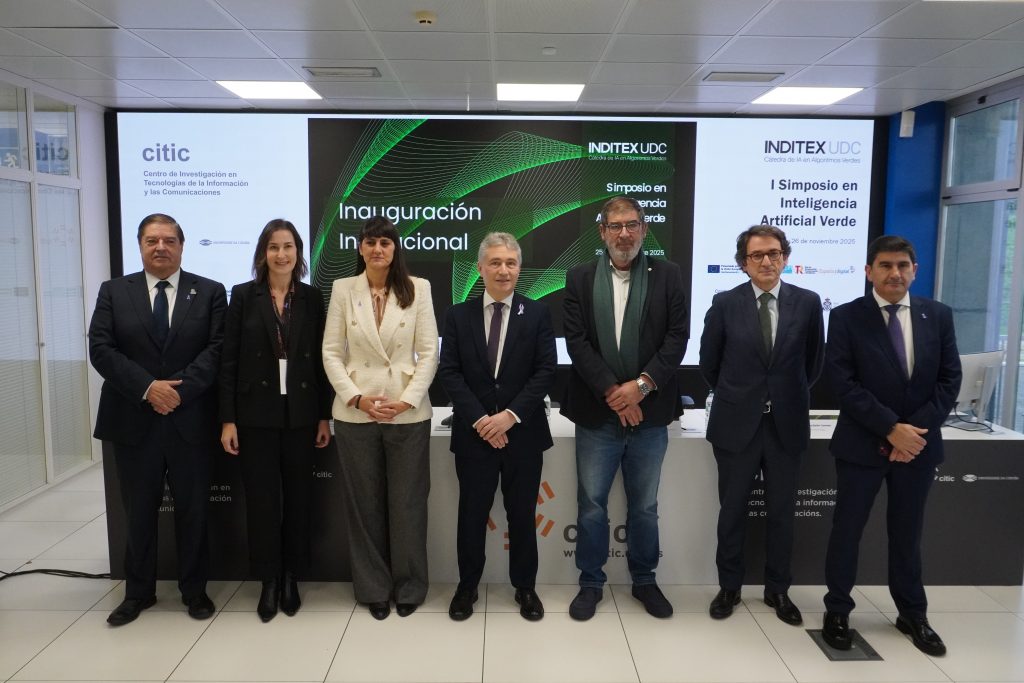
The future of AI is green
- More than two hundred people are taking part today and tomorrow at CITIC–UDC in the First Symposium on Green Artificial Intelligence, promoted by the Inditex–UDC Chair in Green Algorithms
- The event aims to raise awareness of the importance of developing and applying artificial intelligence from a sustainability perspective
- Specialists from different fields will explore various approaches, challenges and success stories to offer a comprehensive view of this responsible technology
A Coruña, 25 November 2025.- At a time when AI promises to optimise everything from energy networks to agricultural systems, the technology itself presents a dilemma: how can its rapid progress be reconciled with the urgency of the climate crisis? The emerging wave of “green AI” seeks not only to be intelligent, but also sustainable. With this premise as its starting point, the First Symposium on Green Artificial Intelligence opened today in A Coruña, an initiative promoted by the Inditex–UDC Chair in AI for Green Algorithms. The event is taking place on Tuesday and Wednesday, 25 and 26 November 2025, at CITIC of the University of A Coruña, a research centre that is part of the CIGUS Network.
More than 200 people are attending this hybrid event, which combines in-person sessions with virtual access for remote participants. Today’s session featured the participation of Spain’s Secretary of State for Digitalisation and AI, María González Veracruz; Javier Monteoliva Díaz, Secretary-General and Secretary of the Board of Directors of Inditex; together with UDC Rector, Ricardo Cao; CITIC Director, Manuel G. Penedo; and the Director of the Inditex–UDC Chair in Green Algorithms, Verónica Bolón.
The symposium seeks to create a meeting space for the research community, the business sector and public institutions to address the current challenges of artificial intelligence from the perspective of sustainability and environmental commitment. In a context where climate change affects society as a whole, and where computational activity—including AI models and data centres—already represents a significant source of greenhouse gas emissions, the Chair advocates a multidisciplinary and cooperative approach.
The expansion of artificial intelligence is driven by increasingly powerful models, which are also more computationally expensive, opaque and energy-intensive. With forecasts suggesting that AI could exceed 30% of global energy consumption by 2030, the green and responsible AI approach becomes increasingly relevant, promoting more efficient systems with a smaller carbon footprint, improved data quality and optimisation, and the transparency required to assess their real impact.
Environmental, social and ethical challenges in AI development
Throughout the symposium, experts will address a variety of challenges. Among them is CITIC researcher Amparo Alonso, who spoke about the environmental challenges posed by AI. In her presentation she introduced two complementary approaches: the Green-In approach, focused on designing more frugal and efficient models; and the Green-By approach, which examines how AI can directly contribute to social and environmental sustainability. Using agent-based models, the talk explored how citizen trust, institutional communication and social influence shape the acceptance of sustainable public policies. “This integrated perspective allows us to move towards truly sustainable AI: energy-efficient, socially acceptable and designed to generate value with the lowest possible impact,” noted Amparo Alonso.
The second invited talk was delivered by Ricardo Vinuesa, professor and researcher in the Artificial Intelligence Group at the University of Michigan, who addressed the role of AI in achieving the Sustainable Development Goals (SDGs). According to his analysis, AI can help achieve 134 SDG targets, although it may hinder 59 of them. Vinuesa stressed “the importance of accompanying the rapid advancement of AI with regulatory oversight and ethical standards to ensure that it contributes to sustainable development.”
On Wednesday 26 November, sessions will continue with the participation of Mar Santamaría Varas, architect and co-founder of 300,000 Km/s, and Jorge Castellanos Claramunt, Professor of Constitutional Law at the University of Valencia.
Awards for research on AI and sustainability
Also on Wednesday, the symposium will feature representation from the Secretary of State for Digitalisation and AI. David Gómez Cordero, Head of Area at the Directorate-General, will present the National Programme on Green Algorithms.
In addition to the expert talks, the symposium includes contributions from researchers, professionals and students interested in the potential of AI for sustainability. A total of 36 submissions were received – 17 oral presentations and 19 posters – from which several awards will be given. Participants are eligible for the following prizes:Green-In, for the best contribution on energy-efficient algorithms or approaches that reduce the carbon footprint of AI; Green-By, for the best contribution using AI as a tool for sustainability or for applications with a positive impact on the environment, energy efficiency or urban planning; and Award for Ethical, Social and Economic Implications, for the best contribution critically addressing ethical, social or economic aspects linked to green algorithms. The awards will be presented during the closing session of the symposium.
About the Chair
CITIC is a research centre that drives progress and excellence in ICT-applied R&D&I. Created in 2008 by the University of A Coruña, its scientific activity is structured into four main research areas: Artificial Intelligence; Data Science and Engineering; High-Performance Computing; and Intelligent Services and Networks, together with a cross-cutting area: Cybersecurity.
CITIC is accredited as a Centre of Excellence and is a member of the CIGUS Network for the period 2024–2027, endorsing the quality and impact of its research. CITIC’s accreditation, structuring and enhancement are co-funded by the Xunta de Galicia and 60% by the European Union under the ERDF Galicia 2021–2027 Operational Programme, with the thematic objective of promoting “a smarter Europe: innovative and intelligent economic transformation” (ED431G 2023/01).





